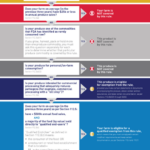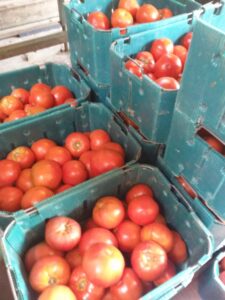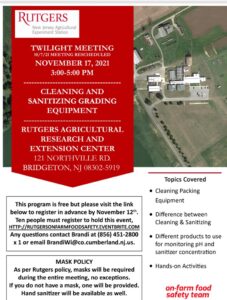The NJ plastic bag ban will impact retail farm markets starting May 4th. Note that enforcement of this ban will vary based on your retail sales location. Counties and municipalities may use their health or other departments for enforcement along with the DEP. Without specific guidance on how to enforce the ban in farm retail settings there will likely be variations based on location.
Some key pieces of information about the rule that may impact your market are detailed below:
Paper bags are banned only for stores that are identified as a “grocery store”. If you are not considered a grocery store (see definition below) you may use paper bags.
Grocery stores are defined as “self-service retail establishment that occupies at least 2,500 square feet and that sells household foodstuffs for offsite consumption, including fresh produce, meat, poultry, deli products, dry foods, baked foods, prepared foods.” We anticipate that enforcement will vary based on local jurisdiction with this definition. If you are a retail farm market that is over 2,500 square feet, including your outdoor sales areas, it is suggested that you communicate with your municipality or county to determine if you can use paper bags or not.
The state does not define what types of plastic bags can be used for exempted items, and we have had varying guidance from DEP. Questions about the rule can be directed to singleuseplastics@dep.nj.gov Contact your municipality or county to determine how they plan to regulate exempted item bagging. DEP identifies the following items as exempt:
- Loose items including: fruits, vegetables, nuts, coffee, grains, baked goods, candy, greeting cards, flowers, small hardware items
- Uncooked meat, fish, or poultry
- Food sliced or prepared to order, including soup and hot foods
You cannot sell single use bags at your store, except for pre-packaged bags such as bulk trash bags, pet waste bags, zip-lock bags, etc.
The regulation does not discuss biodegradable single-use bags that can be decomposed by bacteria and other living organisms in a short period of time. The plastic bag ban is specific to single-use bags made from a synthetic materials. Many biodegradable bags are made from corn-based materials and have improved in their strength since they were first released a number of years ago. Should you plan on purchasing biodegradable bags make sure you can prove what materials they are made of in case of customer or regulatory questioning. The New Jersey Office of Innovation has a listing of companies that sell bags that are allowable under the ban.
Reusable bags ideally should be made of materials that can be easily cleaned and must have handles stitched onto them. Fabrics that can be washed and dried in a machine are preferred since the heat cycle in the dryer will kill any potential human pathogens that find their way onto the bags surface. If purchasing reusable bags to give to your customers be sure to look at the cleaning instructions and communicate proper handling of these bags to your customers. You are not required to provide reusable bags to your customers.
As we better understand this regulation, we will share that information with you.
*article updated on June 15, 2022



